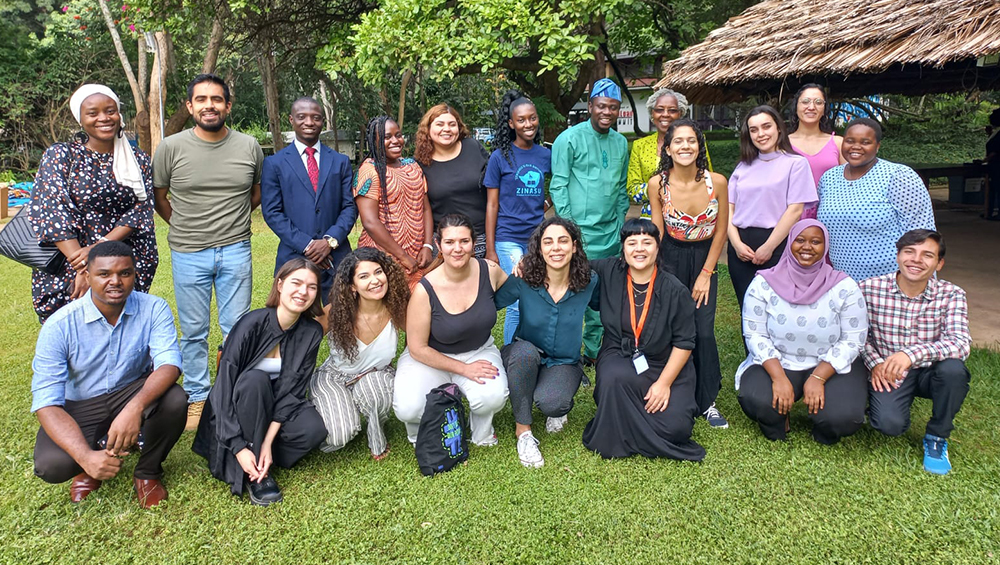Young people strengthen ties to support education
Young people strengthen ties to support education

Key takeaways from Global Campaign for Education’s Global Youth and Student Caucus held in Arusha, Tanzania, March 18–20, 2022.
“What stands out for me from the youth caucus is that amazing feeling of knowing, growing, understanding together, co-creating solutions and sharing the same space with other diverse students and young people.” —Taibat Aduragba Hussain, Brain Builders Youth Development Initiative, Nigeria
The Global Campaign for Education (GCE) convened the Global Youth and Student Caucus held in Arusha, Tanzania, March 18–20, 2022. The caucus was aimed at creating an enabling safe space for youth and students to meaningfully engage on the GCE youth engagement strategy as well as ideate around student- and youth-led actions that may feed into the mechanisms for achieving impact across the different contexts.
The caucus mustered youth and student representatives from six global regions—Latin America, Asia-Pacific, Africa, Middle East, North America and Europe—and included representatives from strategic global partners and forums such as the Global Partnership for Education (GPE), Global Student Forum (GSF) and UNESCO. Various themes were explored during the caucus that gave solid meaning to the youth and student movement.
Meaningful inclusion and participation of youth and students in strategic spaces
Youth and students understand that to ensure meaningful and genuine engagement and social change, inclusion should be the core value that is embodied within all the approaches to this work.
A key emerging theme from the caucus was agreeing on establishing more consistent and deliberate channels for national and regional youth engagement and meaningful participation in strategic spaces, including research, advocacy and campaigns.
“I received an invitation to speak at the Global Action Week for Education (GAWE), sharing the stage with other incredible women in the education space. That demonstrates the value of connections and the caucus’s advantages beyond the days spent in Arusha, Tanzania.” —Taibat Aduragba Hussain, Brain Builders Youth Development Initiative, Nigeria
Shared politics
“Through these shared spaces, I realize, now more than ever, that our fights for equal human rights, no matter what background we come from, can always intersect with each other.” —Rantia Sabbah, Arab Campaign for Education for All, Palestine
During the caucus, the youth and student networks recognized long-standing notions and shared politics, including intersectionality, decolonization and feminism among the key politics that they share.
“In addition to sharing the vision of Honduras at the national level, we have also shared realities from other parts of the world to work on intersectionalities and plan across the eyes of countries and regions.” —Diana Ayala, Dakar Forum, Honduras
Cross-collaboration and cross-regional activities
“Being the first Arab youth representative in the caucus that was held in Tanzania was an experience that exceeded my own expectations.” —Rantia Sabbah, Arab Campaign for Education for All, Palestine
Globally, youth and student networks need modes of connection, collaboration and opportunities to coordinate learning from and action with each other across regions.
“The youth caucus was an eye-opening chance for me to hear students’ and young people’s education stories and lived experiences in their local regions. Hearing a participant speak about education and youth organizing in Palestine prompted me to learn more about Palestine’s history. We all gained a shared understanding of several important concepts such as inclusion, diversity, representation, co-creation and connection.” —Taibat Aduragba Hussain, Brain Builders Youth Development Initiative, Nigeria
Representative structures for youth and students: GCE Youth Action Group
The establishment of the GCE Youth Action Group as a structure under the Youth and Students representative on the GCE Board was a key outcome of the caucus. It aims to amplify the voices of youth and students in GCE’s core activities.
The caucus consultations agreed on how regional coalitions would nominate and elect their representatives to this structure.
“A critical lesson was how purposeful and intentional GCE is in ensuring that students and young people not only are engaged to check boxes but are meaningfully involved in creating their strategies and activities. I am a firm believer in the Youth Action Group’s capacity to advance excellent and inclusive education. Additionally, I have been a part of several global events, meetings and conferences, but GCE is quite purposeful about representation, ensuring that language is not a barrier to students and young people participating in their work. That truly struck a chord with me.” —Taibat Aduragba Hussain, Brain Builders Youth Development Initiative, Nigeria
“The discussion of representation in the youth initiative is important to ensure the election process of the Youth Action Group with the participation of the coalitions, the number of members of each organization and the internal constitution for decision-making.” —Paulocesar Santos, Integra La Educación Se Respecta, Student Movement of Latin American and the Caribbean (MELAC), Peru
#ReclaimingOurEducationAgenda #EducationShiftsPower


